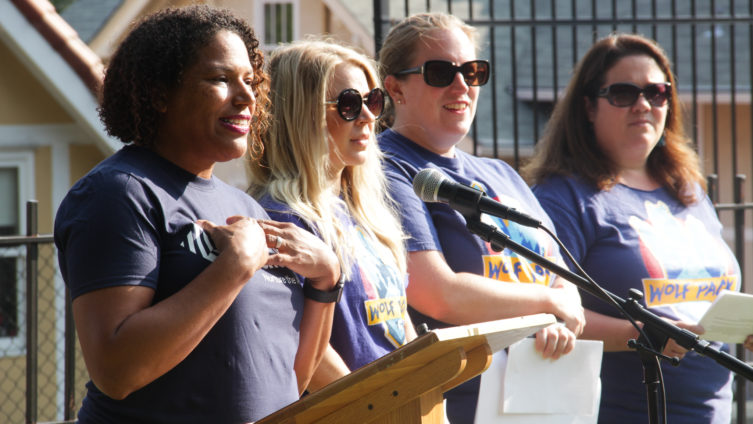
Our campus is full of adult leaders who support the continued growth of The Children’s School in many ways, both big and small. Among the improvements made this year, TCS revamped its progress report structure, boosted STEAM (Science, Technology, Engineering, Arts, and Math) initiatives, and created better policies and procedures for outdoor education — all thanks to the help of faculty members who stepped up in various ways. Our faculty leadership team recognize the huge efforts faculty members made to make this year a success!
Dynamic Competency-Based Progress Reports
The Children’s School is in its second year of a new progress report structure, which shifted from a subject-based format to a competency-based format. This change and process was a direct result the strong faculty leadership. When TCS considered updating its report two years ago, the administration’s first step was to reach out to the faculty and invite them to be a part of a task force to collaboratively study and design the school’s next report structure. It was not a surprise that a number of teachers were willing to step into this leadership role. As a result of their commitment, we ended up with a representative group of faculty that covered the full age range of TCS, and therefore a document that reflected the community’s values.
As part of the process, we convened a focus group of parents and facilitated mixed groups of teachers and parents. Faculty guided their groups to learn what parents wanted to hear about their child in the reports. Similarly, the teachers were able to articulate what they wanted parents to know about their child. Out of this process, the information was summarized and became the core of the report. This group of teachers committed to two full days over the summer to take that feedback and incorporate it into a report prototype. This prototype was shown to the parent focus group and their feedback was integrated over the summer. Once the full faculty returned in the fall, each teacher on the task force led their grade level through the report, gathered feedback from all teachers, and then incorporated that feedback into the report design.
Because of the leadership and commitment of this dedicated group of teachers, we were able to be confident that our progress reports fully reflect what we value at The Children’s School. Their willingness to commit time, energy, and thought were essential to the final document.
One-of-a-Kind Outdoor Education Experiences
The Children’s School’s outdoor education program takes learning into forests and mountains and along rivers and the coast where students are challenged to take on new tasks that push them outside of their comfort zone.
Both educational research and cognitive science confirm that the best learning happens when connections are built between what is learned and what is experienced.
At TCS, we integrate our outdoor education experiences into our academic subjects so there is a clear connection between what is happening in the classroom and the learning that happens on camping trips. Instead of hiring external companies to lead our outdoor trips, TCS teachers plan and lead these trips to meet the specific learning needs of our students.
With passion and purpose, Julia’s leadership in outdoor education has offered The Children’s School a devoted faculty member who works creatively and effectively to design meaningful environmental experiences for students — many of those experiences are directly due to the behind-the-scenes work Julia has managed for nearly 25 years!
Julia’s efforts have helped create a better process for the camping trips so they can run smoothly, ensuring we have gotten the best equipment and training to be safe and have fun! In addition, she has helped onboard new faculty members to our outdoor education program and leads a group of teachers through an annual kayaking trip, teaching the importance of water safety. Every spring, she runs a day-long session for all grades 3 – 8 faculty trip leaders to provide a space to hear the expertise within the group as trip leaders share about their upcoming trips’ (spring and fall) curricular goals and skills for their student-centered outdoor educational experiences.
Teachers find that outdoor trips provide unique opportunities for teachable moments. The obvious lessons are about ecology and outdoor skills. The less obvious are the development of confidence, teamwork, and self-reliance.
From learning to spend the night away from home for the first time to carrying everything you need for several days on your back, the outdoor education program helps our children develop into confident individuals who find success in taking on the academic, physical, and emotional challenges they encounter in the outdoors.









